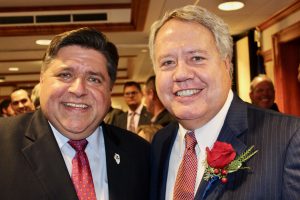Metro-East Democrats see infrastructure bill as top priority

After four years playing defense against Rauner, a chance to move things forward
By CARL GREEN
Illinois Correspondent
Springfield, IL – Metro-East Democrats, just sworn in to new terms in the Legislature, expect a job-creating capital spending bill to be a top priority of the new government led by Governor J.B. Pritzker.
They will be working for the first time in four years in a unified government with a Democrat as governor and strong majorities in both the House and Senate.
Expectations are high, and that fueled the talk on Jan. 9 at a reception for the Metro-East legislators at the AFL-CIO building across the street from the Capitol, attended by both Pritzker and Lieutenant Governor Juliana Stratton.
“Having a governor who is pro-Labor and believes in working men and women in the state of Illinois is paramount, and that’s what we have now,” noted re-elected Representative Jerry Costello (D-Red Bud).
One of the newest state senators, Christopher Belt (D-East St. Louis) had already identified infrastructure as a top priority.
“Right off the bat, I would like for us to pass a capital spending bill to improve our infrastructure – streets that are crumbling, maintenance on our buildings – and while we’re doing that, put people to work,” Belt said.
HOFFMAN ON
THE OFFENSIVE
The event was hosted by Representative Jay Hoffman (D-Swansea), the key figure for Labor in Springfield in recent years as chairman of the House Labor and Commerce Committee.

This year, after four years of playing defense against former Governor Bruce Rauner’s attacks on workers, Hoffman has a chance to move things forward. Infrastructure is high on his priority list, too, along with the budget.
“The biggest priority we should have is to get the budget in order,” he said. “We have inherited a mess from Governor Rauner, and Governor Pritzker is going to really have to make some tough decisions and we’re going to be there to help him.
“The thing we should do immediately this spring session is an infrastructure bill – a capital bill – where we put people to work, whether it’s on roads, bridges, schools, or state buildings like the Department of Corrections. They’ve all been woefully neglected.”
Fixing the budget will help working families by stabilizing their pensions, getting workers paid in a timely manner and providing reasonable wages, he noted. But a capital spending bill would help reverse Rauner’s four-year assault on unions and their members, he said.
RAUNER’S PRIORITIES
“Rauner is one of the first governors in recent history who hasn’t even made that a simple priority,” he said. “I think part of it was because he didn’t want union workers to have the jobs – because he was totally an anti-union governor. It’s my belief that that has to be our number one priority, because along with economic development, there will be good jobs and it will help solve some of our budget issues. I think it all feeds into each other.”
That would be good news to some of the Labor leaders who journeyed to Springfield for the reception, including Scot Luchtefeld, president of the Southwestern Illinois Central Labor Council, and Glyn Ramage, business manager for the Southwestern Illinois Laborers District Council.
“If we can get this infrastructure plan, we can put people to work in good paying jobs, and that’s what we’re looking for,” Ramage said. “The state’s been in a stalemate for four years.”
Luchtefeld added another suggestion – to figure out a way to get a handle on the state’s pension liabilities, which have been out of control for decades and weigh on its ability to accomplish anything.
“Let’s fix the pensions,” he said. “Let’s let everybody sit down at the table and help fix the pensions – and the capital bill with infrastructure.”
Costello was in agreement on the pension issue.
“What it’s going to take is to get both sides to sit down,” he said. “It’s got to be the General Assembly, it has to be Labor – everybody involved – to sit down at a table and negotiate this system out.”
Costello warned that after four years of stalemate, Pritzker and the Legislature will be under pressure to solve all of the problems at once, but that’s just not realistic.
“Everybody’s going to have to give and take,” he said. “Incremental steps forward is what you can expect, and that’s what I do expect.”
WORKERS COMP
Hoffman is primed to move ahead on several fronts, many involving the Department of Labor, which was turned into a battle zone under Rauner.
For one thing, Pritzker will replace Workers Compensation Commission arbitrators that Rauner appointed, giving workers some needed support. A new law, passed by overriding Rauner’s veto, aims at bringing down the cost to employers by installing a rate review system.
“The governor’s office and the Department of Insurance are going to be responsible for implementing that,” Hoffman said. “And that bill, for the first time in Illinois, will mirror most other states and have rate review of workers compensation rates so that the insurance companies aren’t just gouging the employers, who then come and want other reforms that hurt injured workers.”
PREVAILING WAGE
The Department of Labor is in for major changes after four years in which it was ordered not to enforce the prevailing wage laws intended to protect workers on public construction projects.
“Under Rauner, there’s been a huge rollback of some of the regulations at the Department of Labor, such as enforcement of prevailing wage laws that make sure that people who work on these public works jobs actually are paid prevailing wages,” Hoffman said. “There’s really no enforcement in Illinois. I see Governor Pritzker actually strengthening the Department of Labor to help make sure prevailing wage laws are enforced.”
Hoffman also plans to re-introduce legislation that would allow the Attorney General’s office to enforce prevailing wage, workers compensation and minimum wage laws, using information from the Department of Labor.
PUBLIC EMPLOYEES
Illinois public employees have their own issues to deal with, and one is a major goal for Costello – to replace the long-expired contract between the state and AFSCME, their union.
 “What I would like to do is make to sure the union men and women who work for our state get a contract,” he said. “You’re talking about AFSCME –they’re owed their step increases still (Rauner refused to pay them) and we need to have a contract.”
“What I would like to do is make to sure the union men and women who work for our state get a contract,” he said. “You’re talking about AFSCME –they’re owed their step increases still (Rauner refused to pay them) and we need to have a contract.”
Teachers, too, have their concerns, and Marcus Albrecht, the Illinois Education Association representative from Edwardsville, came to the reception to advance a few priorities including:
• Repeal a 2017 law that caps raises at three percent for teachers in their 10 years before retirement. “That’s an obstacle to bargaining,” Albrecht said. “If it’s not repealed, it will cause a whole bunch of strikes this year because it unfairly penalizes veteran teachers.”
• Abolish the current two-tiered pension system and making everyone eligible for the same pension system.
• Abolish the Illinois State Charter Commission, which has the power to force school districts to accept charter schools against their will.
• Eliminate the tax cut for people who contribute to private schools, approved in a compromise last year. “That’s money that comes right out of our public school funding,” Albrecht said.
He believes all four goals can be accomplished by the Legislature and governor and he will be looking for quick action on the salary cap.
WORKING FOR FREE
Representative Katie Stuart (D-Edwardsville) said she will continue trying to rebuild and improve the state’s schools and will urge removal of the salary cap.
“It’s arbitrary, and it doesn’t make sense,” she said. “You’re asking teachers to work for free, which is inappropriate to do. We need to clean that up, fix it and get that done.”
Stuart also will revive a push to increase the state’s minimum salary for public school teachers and to continue helping to rebuild the state university system. The minimum salary now is $9,000, set in 1980. Rauner vetoed legislation last year to raise it to $40,000 over five years.


